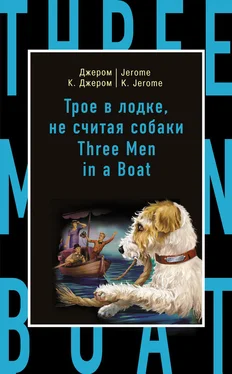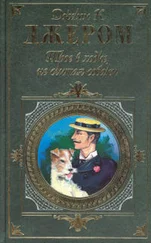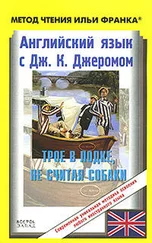It was a great success, that Irish stew. I don’t think I ever enjoyed a meal more. There was something so fresh and piquant about it. One’s palate gets so tired of the old hackneyed things: here was a dish with a new flavour, with a taste like nothing else on earth.
And it was nourishing, too. As George said, there was good stuff in it. The peas and potatoes might have been a bit softer, but we all had good teeth, so that did not matter much: and as for the gravy, it was a poem – a little too rich, perhaps, for a weak stomach, but nutritious.
We finished up with tea and cherry tart. Montmorency had a fight with the kettle during tea-time, and came off a poor second.
Throughout the trip, he had manifested great curiosity concerning the kettle. He would sit and watch it, as it boiled, with a puzzled expression, and would try and rouse it every now and then by growling at it. When it began to splutter and steam, he regarded it as a challenge, and would want to fight it, only, at that precise moment, some one would always dash up and bear off his prey before he could get at it.
To-day he determined he would be beforehand. At the first sound the kettle made, he rose, growling, and advanced towards it in a threatening attitude. It was only a little kettle, but it was full of pluck, and it up and spit at him.
“Ah! would ye!” growled Montmorency, showing his teeth; “I’ll teach ye to cheek a hard-working, respectable dog; ye miserable, long-nosed, dirty-looking scoundrel, ye. Come on!”
And he rushed at that poor little kettle, and seized it by the spout.
Then, across the evening stillness, broke a blood-curdling yelp, and Montmorency left the boat, and did a constitutional three times round the island at the rate of thirty-five miles an hour, stopping every now and then to bury his nose in a bit of cool mud.
From that day Montmorency regarded the kettle with a mixture of awe, suspicion, and hate. Whenever he saw it he would growl and back at a rapid rate, with his tail shut down, and the moment it was put upon the stove he would promptly climb out of the boat, and sit on the bank, till the whole tea business was over.
George got out his banjo after supper, and wanted to play it, but Harris objected: he said he had got a headache, and did not feel strong enough to stand it. George thought the music might do him good – said music often soothed the nerves and took away a headache; and he twanged two or three notes, just to show Harris what it was like.
Harris said he would rather have the headache.
George has never learned to play the banjo to this day. He has had too much all-round discouragement to meet. He tried on two or three evenings, while we were up the river, to get a little practice, but it was never a success. Harris’s language used to be enough to unnerve any man; added to which, Montmorency would sit and howl steadily, right through the performance. It was not giving the man a fair chance.
“What’s he want to howl like that for when I’m playing?” George would exclaim indignantly, while taking aim at him with a boot.
“What do you want to play like that for when he is howling?” Harris would retort, catching the boot. “You let him alone. He can’t help howling. He’s got a musical ear, and your playing MAKES him howl.”
So George determined to postpone study of the banjo until he reached home. But he did not get much opportunity even there. Mrs. P. used to come up and say she was very sorry – for herself, she liked to hear him – but the lady upstairs was in a very delicate state, and the doctor was afraid it might injure the child.
Then George tried taking it out with him late at night, and practising round the square. But the inhabitants complained to the police about it, and a watch was set for him one night, and he was captured. The evidence against him was very clear, and he was bound over to keep the peace for six months.
He seemed to lose heart in the business after that. He did make one or two feeble efforts to take up the work again when the six months had elapsed, but there was always the same coldness – the same want of sympathy on the part of the world to fight against; and, after awhile, he despaired altogether, and advertised the instrument for sale at a great sacrifice – “owner having no further use for same” – and took to learning card tricks instead.
It must be disheartening work learning a musical instrument. You would think that Society, for its own sake, would do all it could to assist a man to acquire the art of playing a musical instrument. But it doesn’t!
I knew a young fellow once, who was studying to play the bagpipes, and you would be surprised at the amount of opposition he had to contend with. Why, not even from the members of his own family did he receive what you could call active encouragement. His father was dead against the business from the beginning, and spoke quite unfeelingly on the subject.
My friend used to get up early in the morning to practise, but he had to give that plan up, because of his sister. She was somewhat religiously inclined, and she said it seemed such an awful thing to begin the day like that.
So he sat up at night instead, and played after the family had gone to bed, but that did not do, as it got the house such a bad name. People, going home late, would stop outside to listen, and then put it about all over the town, the next morning, that a fearful murder had been committed at Mr. Jefferson’s the night before; and would describe how they had heard the victim’s shrieks and the brutal oaths and curses of the murderer, followed by the prayer for mercy, and the last dying gurgle of the corpse.
So they let him practise in the day-time, in the back-kitchen with all the doors shut; but his more successful passages could generally be heard in the sitting-room, in spite of these precautions, and would affect his mother almost to tears.
She said it put her in mind of her poor father (he had been swallowed by a shark, poor man, while bathing off the coast of New Guinea – where the connection came in, she could not explain).
Then they knocked up a little place for him at the bottom of the garden, about quarter of a mile from the house, and made him take the machine down there when he wanted to work it; and sometimes a visitor would come to the house who knew nothing of the matter, and they would forget to tell him all about it, and caution him, and he would go out for a stroll round the garden and suddenly get within earshot of those bagpipes, without being prepared for it, or knowing what it was. If he were a man of strong mind, it only gave him fits; but a person of mere average intellect it usually sent mad.
There is, it must be confessed, something very sad about the early efforts of an amateur in bagpipes. I have felt that myself when listening to my young friend. They appear to be a trying instrument to perform upon. You have to get enough breath for the whole tune before you start – at least, so I gathered from watching Jefferson.
He would begin magnificently with a wild, full, come-to-the-battle sort of a note, that quite roused you. But he would get more and more piano as he went on, and the last verse generally collapsed in the middle with a splutter and a hiss.
You want to be in good health to play the bagpipes.
Young Jefferson only learnt to play one tune on those bagpipes; but I never heard any complaints about the insufficiency of his repertoire – none whatever. This tune was “The Campbells are Coming, Hooray – Hooray!” so he said, though his father always held that it was “The Blue Bells of Scotland.” Nobody seemed quite sure what it was exactly, but they all agreed that it sounded Scotch.
Strangers were allowed three guesses, and most of them guessed a different tune each time.
Читать дальше
Конец ознакомительного отрывка
Купить книгу









